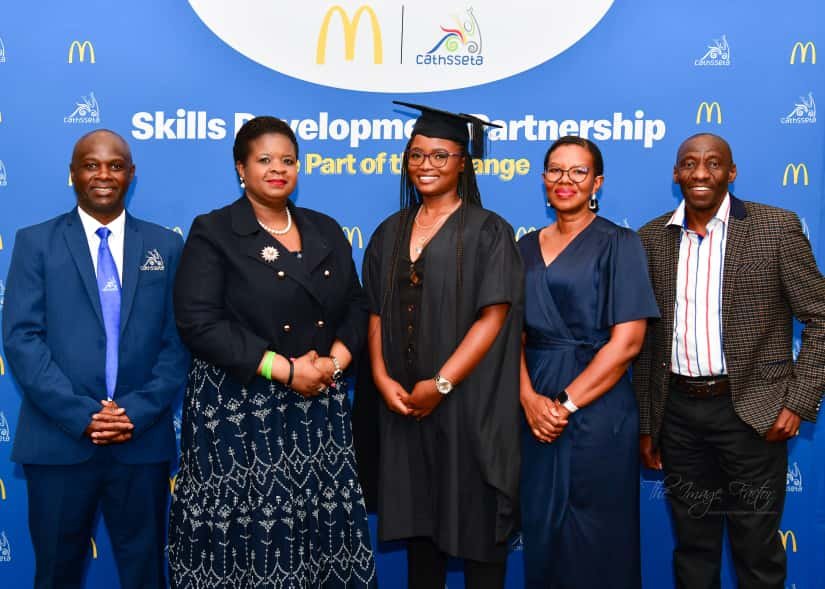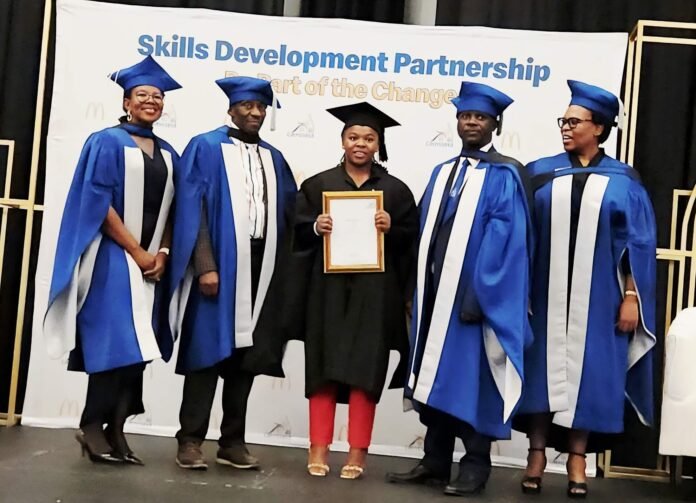Johannesburg, South Africa — In a country where youth unemployment hovers above 45%, McDonald’s South Africa is proving that partnerships grounded in purpose can create real change. In collaboration with the Culture, Arts, Tourism, Hospitality, and Sport Sector Education and Training Authority (CATHSSETA), the company recently celebrated the graduation of 676 young South Africans who successfully completed its national Hospitality Learnership Programme — a life-changing initiative designed to turn opportunity into empowerment.
By and large, this initiative forms part of McDonald’s global Youth Opportunity program, launched in 2018 to remove barriers to employment for 2 million young people worldwide by 2025. The South African learnership, aligned with CATHSSETA’s High Impact Programme, equips learners with NQF Level 3 qualifications in hospitality, blending 70% on-the-job experience with theoretical training — and, crucially, guaranteed job absorption for 80% of graduates.
“We can’t stand back as a company that hires so many young people and do nothing,” said Dr. Mamello Masia, McDonald’s South Africa’s Chief People Officer, during a sideline interview with NOWinSA (Editor Tankiso Komane.
“Given the scale of unemployment in our country, we had to be intentional — to design a program that’s not only impactful but scalable. Because without developing your people, you simply don’t have a business.”
This program, she explains, is more than corporate social responsibility — it’s a strategic investment in South Africa’s human capital. “Every trainee starts from entry level — from crew in the kitchen — but we make sure they gain both theory and practical training. Once qualified, they are job-ready. Who better to employ them than us? McDonald’s hires around 3,000 crew a year, so why not be deliberate about how we do it — and build real careers from it?”

From crew to career: Building a pathway of growth
For McDonald’s, the commitment doesn’t end at the first paycheck. “The primary purpose is to address youth unemployment,” Dr. Masia emphasized. “But equally, it’s about creating a career pipeline. We have people in our business who started as crew and are now directors. Growth is not just possible — it’s encouraged.”
That growth mindset runs deep within McDonald’s culture. Founded 70 years ago by Ray Kroc, whose philosophy that “the heart of McDonald’s is its people” remains central, the company continues to invest in its people-first legacy — from its 70th anniversary global celebrations to its 30-year anniversary in South Africa.
Public-private partnerships as a catalyst for change
At the graduation event, CATHSSETA CEO Mr. Marks Thibela described the collaboration as “proof that co-investment between the private and public sectors can produce credible and scalable responses to youth unemployment.”
He lauded McDonald’s for not only training but employing the majority of its graduates, saying, “This is what sustainable empowerment looks like.”
The numbers confirms this impact. From the broader programme, of 1,400 learners trained, over 476 were permanently absorbed into McDonald’s South Africa, with another 75% now employed full-time elsewhere in the hospitality sector.
As Dr. Masia highlighted, the program also utilises Training Force and McDonald’s Hamburger University — the company’s global centre of excellence in restaurant operations — ensuring that graduates emerge with globally relevant, industry-recognised skills.
A blueprint for Corporate South Africa
For Dr. Masia, the success of this partnership is a demonstrable proof-of-concept that Corporate South Africa can—and must—replicate. She believes the scale of the unemployment crisis demands a collective response.
“We can’t solve unemployment alone,” she stated, “but together — government, industry, and business — we can create pathways to dignity and progress.”
For her, the call to action for other companies is built on a pragmatic foundation. “The question isn’t whether you can solve the entire crisis,” she reframed for her peers. “The question is whether you are leveraging your unique operational assets. We have a national footprint and a constant demand for crew—that is our leverage.
“It’s about using your hiring strategy, your training departments, and your career ladder as deliberate tools for social impact,” she explained. “We’ve proven it can be done at scale without sacrificing business fundamentals; in fact, it strengthens them by building a loyal, skilled, and growing workforce.”
This model—where a company’s core operational engine becomes a vehicle for national development—is the powerful blueprint McDonald’s offers. It’s a direct challenge for businesses to look inward, identify their own ‘footprint’ and ‘pipeline,’ and turn them into pathways of progress for the country’s youth. his ethos of building talent pipelines extends beyond the restaurants, reflected in other initiatives like the Girl Unlimited High Tea fundraiser, which invests in the next generation of female leaders from the ground up.
Restoring dignity, rebuilding hope
The event was not just a graduation; it was a celebration of perseverance and purpose. Deputy Minister Gondwe commended the program, saying,
“This initiative has brought hope to individuals, restored dignity to families, and reignited pride in communities. These are the kinds of projects that reclaim the dignity of our youth and strengthen the social fabric of our country.”
As McDonald’s marks 30 years of operations in South Africa, its message remains clear — there is no us without you.
From crew to director, from unemployment to empowerment, McDonald’s South Africa is showing that when the private sector leads with purpose, transformation follows.

